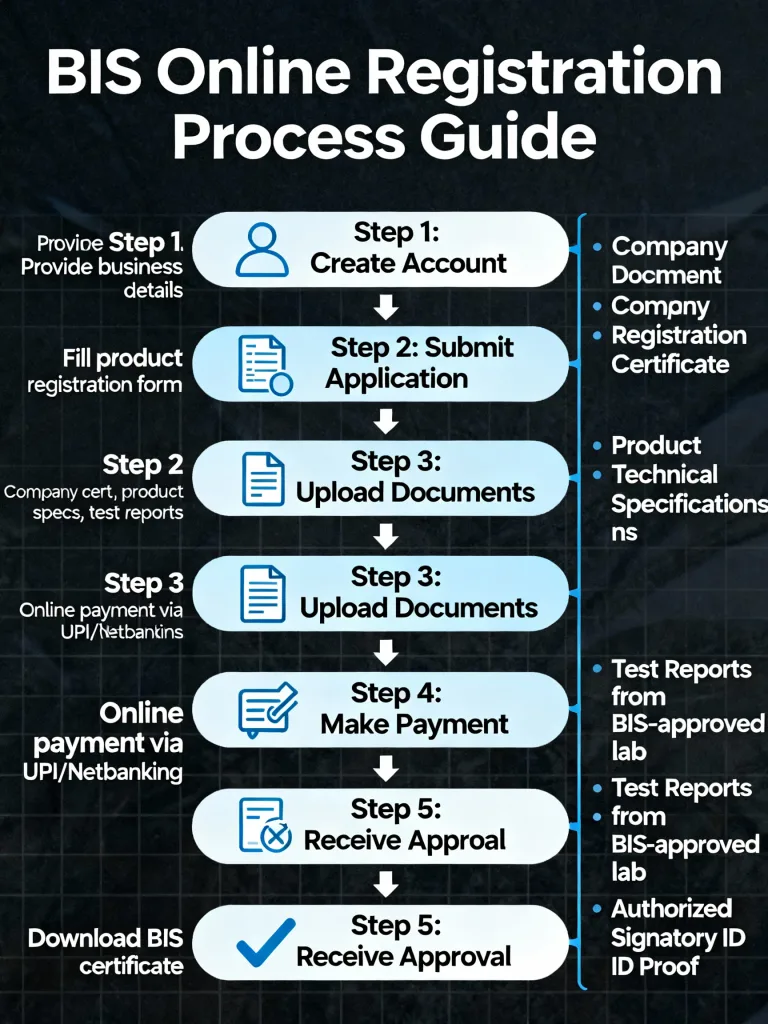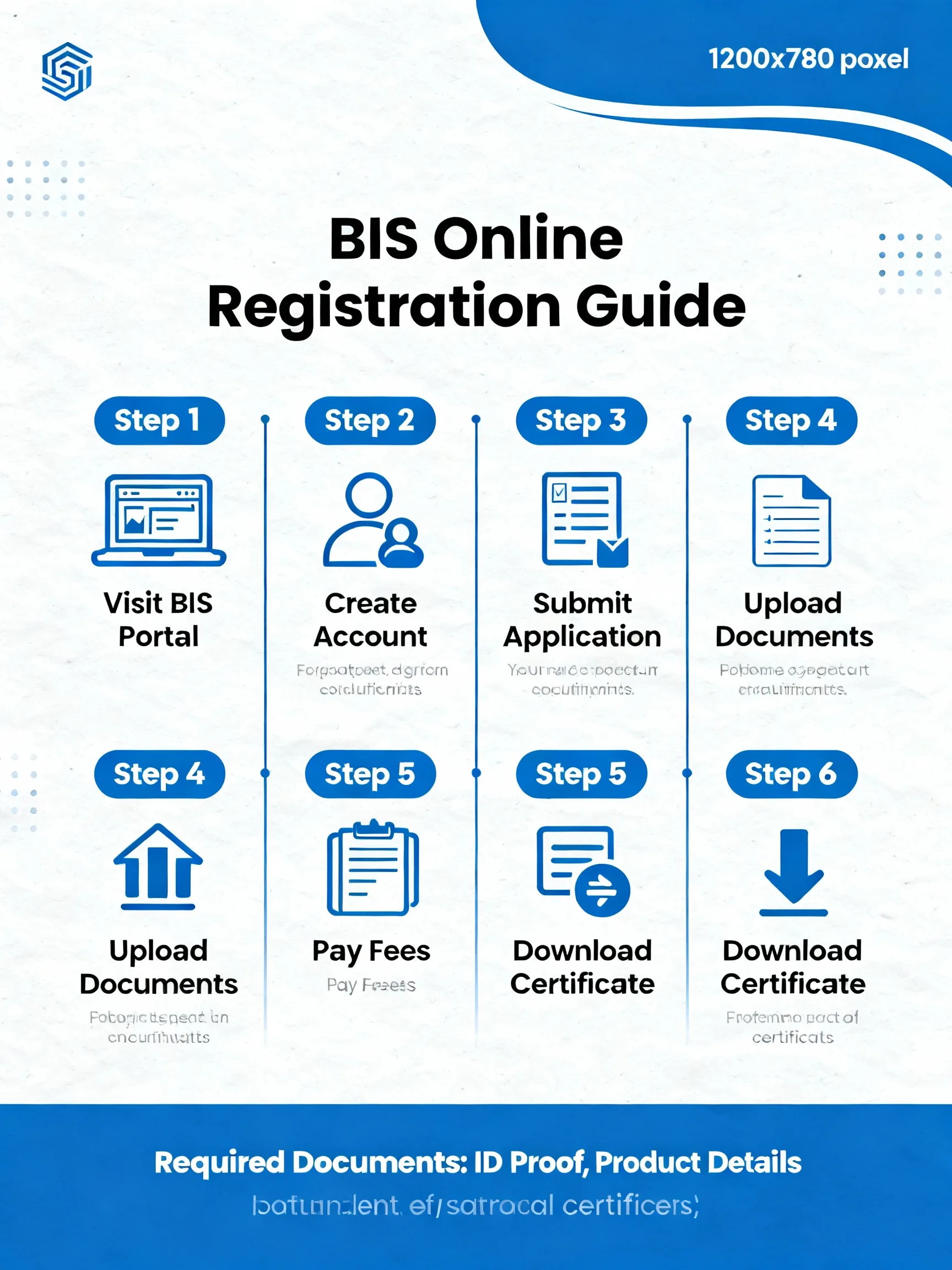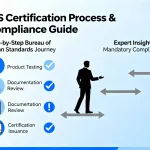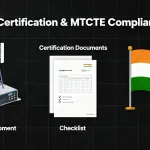BIS Registration
Getting BIS Registration basically means you’ve received official approval from the Bureau of Indian Standards saying your product actually meets the Indian Standard that applies to it. It’s not complicated — it’s just the government’s way of making sure what you’re selling is up to the mark.
The Bureau of Indian Standards, which works under the Ministry of Consumer Affairs, was set up through the BIS Act 2016. It’s the national body that deals with almost everything related to standards in India. They create standards, test products, certify them, run labs, offer training, handle hallmarking — honestly, they’re involved in a lot more behind the scenes than people usually realize.
So when a product gets BIS registration, it isn’t just some badge. It’s a straightforward, third-party confirmation that the product is safe to use, reliable, and built with proper quality in mind.
There is a strange moment that every manufacturer faces when they are finally ready to introduce a product into the Indian market….. that quiet hesitation just before they step in….. wondering if everything behind the scenes is truly aligned with the standards that protect millions of users across the country. I have seen this moment often….. especially with first time manufacturers who underestimate how deeply the Bureau of Indian Standards shapes the safety culture of India.
When people hear the term BIS for the first time….. many imagine a complicated stream of paperwork….. officials….. inspections….. and rules. But when you get close to the system….. you begin to see something else….. a national effort to create trust between the maker and the user. BIS is not simply an institution….. it is a bridge that keeps the quality of products from slipping through the cracks.
A product that carries the BIS certificate or registration is not just wearing a mark….. it is making a promise. And behind that promise is a practical….. step by step….. very real BIS registration journey that every responsible manufacturer has to take.
I want to walk you through that journey in a very human way….. without overwhelming you….. without sounding like a rigid textbook….. simply telling you what it actually feels like to navigate this world.
Understanding BIS….. The National Standards Body of India
There is something reassuring about knowing that behind every safe appliance….. every tested cable….. every regulated piece of electrical equipment….. there is a national standards body quietly working in the background. The Bureau of Indian Standards was set up by the Government of India as the authority that prepares….. maintains….. and updates national standards.
Over the years….. its role has expanded into certifying thousands of products….. monitoring the market….. running the Compulsory Registration Scheme….. overseeing the ISI mark certification….. and ensuring that anything sold in India aligns with the quality standards laid down through the BIS Act.
When you observe the work of BIS officials or talk to a BIS officer….. you see the intent….. the seriousness….. and at times a very human frustration when manufacturers try to bypass mandatory BIS requirements. The system exists to protect people….. and when a standard mark appears on a product….. that tiny symbol carries the weight of decades of regulatory learning.
The Human Side of BIS Certification
People often assume BIS certification in India is only a technical procedure. But it has an emotional impact on businesses too. A valid BIS license gives a kind of confidence that cannot be manufactured overnight. It reassures distributors….. strengthens market reputation….. and opens doors to supply chains that would otherwise remain closed.
For foreign manufacturers……. BIS plays an equally important role through the foreign manufacturers certification scheme….. helping overseas producers follow Indian quality standards so that their products can be sold in India with a valid BIS certification mark.
When a business finally foreign manufacturers certification scheme obtains a BIS certificate….. it becomes part of a larger ecosystem built on credibility. That sense of belonging matters more than most people realize.
Why BIS Registration Matters More Than Ever
There are moments in industry when standards become more than guidelines. Certain products under compulsory certification cannot legally be sold without BIS certification scheme approval. Electronics and information technology devices often fall under the Compulsory Registration Scheme….. known as BIS certificate registration CRS.
Why such strictness….. you might wonder. Because consumer safety in modern India depends heavily on tested components that do not fail under routine conditions. A loose wiring standard….. a poorly designed adapter….. an unstable chemical composition….. any of these can put lives at risk.
Manufacturers who hold a valid mandatory BIS registration understand the importance of these quality checks. Those who try to operate without it eventually encounter market rejection….. penalties….. or complete bans under the Compulsory Registration Order.
Products That Require BIS Certification
If you walk through any Indian marketplace….. you will see countless products that carry the ISI mark or the BIS standard mark with a unique registration number. These are usually items falling into categories where certification is mandatory. Some examples include electronics….. household appliances….. cables….. safety equipment….. cement….. steel….. and other products that form the backbone of daily life.
Each product category is linked to specific isi mark on their products or BIS Certificate in India standards….. and each manufacturer must comply completely before the certification is granted.
Types of BIS Registration
People often assume that BIS has only one kind of certificate….. but the system is more diverse than that. There are several types of BIS registration depending on the nature of the product….. the type of certification….. and the requirements laid down by the BIS Act. Some of the major types include…..
ISI Mark Certification
This is one of the oldest and most trusted certification schemes. When a product carries the ISI mark….. it signals compliance with Indian Standards after thorough inspection and surveillance.
Compulsory Registration Scheme….. CRS
This scheme applies mainly to electronics and information technology equipment. Manufacturers need to apply for BIS under the CRS scheme before selling their products in India.
BIS License under the Eco Mark Scheme
This focuses on environmentally friendly products that meet specific eco related standards.
Foreign Manufacturers Certification
A special pathway designed for companies outside India that want to obtain BIS registration to sell products within the country.
Each type of certification involves different testing processes….. documents….. inspection methods….. and fees.
The BIS Registration Process Explained Through Real Experience
The first time I helped a manufacturer apply for BIS registration….. the room was filled with a strange mix of excitement and worry. The client had developed an innovative electronic device….. but had no idea how the BIS registration process worked. What seemed like a mountain at first became manageable once we broke it down step by step.

Step One….. Identifying the Applicable Standard
Every product corresponds to an Indian Standard. Without identifying the correct BIS standard….. the entire process becomes directionless.
Step Two….. Preparing the Documents Required for BIS
This is where most businesses feel overwhelmed. The documents often include manufacturing process flow….. details of the factory….. machinery list….. quality management system documents….. test reports….. and proof of authorization when dealing with foreign manufacturers.
Step Three….. Submitting the BIS Application
Whether you are applying for BIS certification in India or through the BIS online portal….. the BIS application form has to be filled with precision. Small errors here often lead to delays that can stretch for weeks.
Step Four….. Product Testing
BIS officers work closely with recognized laboratories. Products are tested against the Indian Standards. A failed test means revisiting the manufacturing process….. making corrections….. and retesting.
Step Five….. Factory Inspection
For certain types of BIS license requirements….. officials inspect the manufacturing unit to verify the production capability and quality control procedures.
Step Six….. Grant of BIS Certificate
If everything is satisfactory….. the BIS registration certificate is issued. The manufacturer can now use the standard mark with a unique registration number on products sold in India.
Step Seven….. Surveillance and Renewal of the BIS
A BIS certificate is not permanent. There is a validity of BIS certification….. usually several years….. after which renewal becomes necessary. Periodic surveillance ensures that the manufacturer continues to meet the standards.
The BIS CRS registration process basically moves through a few steps, and while it sounds formal on paper, the flow is pretty simple once you know what’s involved.
First, you create an account on the BIS CRS portal. This means filling out their online form and waiting for the login details they send you. Nothing complicated here — just the usual sign-up routine.
After you’re able to log in, you’ll have to get your product tested. You generate a test request from your dashboard and send the product to a BIS-approved laboratory. Only reports from these authorized labs count, so this part is important.
Once you will get the test report, you need to submit your BIS application. This can be done online, and you have to make sure the test report is still valid — BIS only accepts reports that are less than 90 days old. Along with this, they’ll ask for a bunch of documents listed in their checklist, so everything has to be uploaded together.
From there, the ball is in BIS’s court. Their officials go through your report and the paperwork you submitted to see whether everything matches the requirements.
If all the documents line up and the product meets the standard, BIS issues the license. This is what finally allows the manufacturer to use the Standard Mark with its unique R-number on the product.
Many businesses do not realize that certification is mandatory even during renewal….. and operating with an expired certificate can lead to penalties.
Common Challenges Faced During BIS Registration
There are memories of late night calls from clients who felt stuck at some point in the process. Maybe a report was missing….. maybe the lab test was delayed….. maybe the BIS officer required additional documents.
The journey is rarely smooth. But it becomes easier when you understand that the goal is not bureaucracy….. the goal is consumer safety.
Some challenges include…..
-
Wrongly identifying the BIS standard
-
Incomplete documents required for BIS
-
Confusion related to BIS fees
-
Mismatch between product construction and submitted details
-
Delay in laboratory testing
-
Errors in the BIS registration application
Once these issues are sorted….. the process moves forward with clarity.
Documents and Fees Required For BIS Registration
When you go through the BIS Registration process under the CRS scheme for any electronic item, BIS asks for a bunch of documents—nothing too intimidating, but everything has to be accurate and neatly lined up. In most cases, you’ll be asked for the following:
-
A Self-Declaration of Conformity, basically a statement saying your product meets the applicable Indian standards.
-
A test report from a BIS-recognized lab. This report should reflect the performance of your final product and also touch on any major components or materials used in it.
-
Proof of the manufacturer’s identity, including the company’s name, address, and a quick summary of what they actually manufacture.
-
The acknowledgement slip you receive from the BIS portal after completing the initial application.
-
Details of the authorized signatory, along with supporting documents—BIS wants to know who’s officially signing off on behalf of the company.
-
Information about the exact samples that will be shared with BIS for testing.
-
And lastly, a clear breakdown of all the models or variants you want covered under the registration.
Let me list the commonly required documents….. based on what I have seen manufacturers submit repeatedly…..
-
Factory registration papers
-
Manufacturing process flow chart
-
List of machinery
-
List of raw materials
-
Layout of the unit
-
Testing equipment list
-
Internal quality control documents
-
Authorization letter for Indian representatives in case of foreign manufacturers
-
Test reports from registered with BIS recognized laboratories
-
Identity documents of the applicant
-
Undertakings related to BIS compliance
Every document serves a purpose….. and missing even a single one slows things down.
Fees For BIS Registration
The fees vary depending on the product category….. the type of certification….. lab testing requirements….. and the license duration. Manufacturers should always prepare for additional testing fees….. renewed bis certificate fees….. and at times inspection expenses.
There is no universal fixed amount….. but the cost is usually manageable when compared to the long term benefit of entering the Indian market with confidence.
Obtain BIS Certification or BIS Registration Fees for Electronic Products (Human-Written Version)
When you apply for BIS registration for any electronic or IT product, there are a few fixed charges you’ll need to account for. The structure looks simple at first glance, but each part serves a different purpose. Here’s how the fees usually stack up:
Fee Type New Application Renewal Inclusion
Application Fee ₹1,000 ₹1,000 —
Processing Fee* ₹50,000 (₹25,000 × 2) ₹50,000 ₹30,000 (₹15,000 × 2)
Registration Fee* ₹2,000 (₹1,000 × 2) ₹2,000 —
Total ₹53,000 ₹53,000 ₹30,000
A couple of things worth noting:
Both the processing and registration fees cover a minimum two-year period, so you’re not paying this every few months.
The cost mentioned above applies to one test report only. If you need to submit extra reports, BIS adds ₹20,000 per additional report for new applications and inclusions.
The total cost isn’t the same for everyone—it may shift depending on:
where the manufacturer is located (India or abroad),
the type of product you’re registering,
the number of models you’re including,
and the government fees applicable at that moment.
How Long It Usually Takes to Get a BIS Licence
If you’ve already had your product tested earlier, BIS will allow you to use those test reports—as long as they aren’t older than 90 days from the date they receive your online application.
The same rule applies when you’re submitting a supplementary test report for a product under a brand that BIS has already approved.
Once your documents are uploaded correctly and everything checks out, BIS begins the evaluation. They don’t collect new product samples at this point; that only happens later during routine surveillance.
Under normal circumstances, BIS issues the licence in about 20 working days.
However, if something in your documents or reports doesn’t match their requirements, BIS sends you a notice. You’re then given 30 days to sort out the issues. If corrections aren’t made within that timeframe, the application is essentially considered closed.
Validity and Renewal of a BIS Registration
A BIS license is valid for several years depending on the scheme. Once the validity period ends….. renewal becomes necessary to maintain compliance. Manufacturers must keep track of deadlines because operating without a valid BIS registration certificate can lead to suspension or cancellation. A BIS licence for electronics is valid for at least two years. If everything remains compliant during follow-up checks, you can request a renewal for another minimum two-year term.
I have seen businesses ignore the renewal timeline….. and regret it later when supply chains froze overnight.
Just make sure you don’t let the renewal date sneak up on you. BIS won’t simply renew the licence by default. They look at whether you’ve actually submitted the renewal form, paid whatever fees are due for the next period, and cleared any earlier dues. Once all of that is sorted out and nothing is pending on your side, they generally go ahead and renew the licence without much trouble.
Once all of that is taken care of, BIS extends the licence without much hassle.
Benefits Of BIS Certification
There is a personal satisfaction that comes when a product finally carries a valid BIS certification mark. It reflects trust….. reliability….. quality….. and adherence to national standards. The benefits are real…..
-
Stronger market acceptance
-
Increased consumer trust
-
Smooth entry into the Indian market
-
Compliance with government regulations
-
Reduced risk of product rejection
-
Safer product performance
-
Long term credibility
Manufacturers often feel the difference instantly….. distributors respond faster….. retailers show more confidence….. and consumers feel more assured.
Products That Fall Under Compulsory Registration Scheme….. CRS
Electronics have grown too quickly in India….. and with rapid growth comes risk. The Ministry of Electronics and Information Technology introduced the Compulsory Registration Order to protect users from substandard equipment.
Products under the BIS CRS include a long list of electronic and IT goods that must obtain BIS registration before they can be sold online in India or offline stores.
A registration number appears on each product….. serving as proof that it has passed all required tests.
BIS Online Registration….. A Growing Trend
Earlier….. manufacturers had little choice but to work through paperwork physically. Today….. a major part of the process can be done through BIS online systems. Despite the convenience….. the responsibility remains the same. Accuracy in the application matters more than the platform used.
Businesses that apply for BIS registration online often appreciate the transparency….. the ability to track application status….. and the ease of uploading documents.
What Many People Forget About BIS Registration
There is one thing I wish more manufacturers knew. BIS is not only about testing and certificates. It is about adopting a mindset of quality. When you walk through a manufacturing unit that has already obtained BIS certification….. everything feels more structured. Workers follow processes. Quality checks are taken seriously. Documentation is maintained cleanly.
It is almost as if the certification elevates the discipline of the entire operation.
I have witnessed factories transform after receiving their BIS license. Not because they had to….. but because the experience changed the way they approached their own craft.
A Final Word
If you have reached this far….. I want you to know something. BIS registration is not a hurdle you endure. It is a responsibility you accept. The Indian market is huge….. diverse….. unpredictable….. and filled with opportunity. But opportunity favors only those who commit to quality from the ground up.
Whether you are planning to introduce your first product….. expand your lineup….. apply for BIS….. renew a BIS certificate….. or simply understand the system better….. take it one step at a time….. and do it with sincerity.
The journey may feel long….. but every manufacturer who completes it stands a little taller….. knowing that their product carries the strength of national standards behind it.
Frequently Asked Questions
There are always questions that linger in the mind of every manufacturer when they first hear about BIS registration. Some questions come from confusion….. some from fear….. and some from a genuine desire to understand how quality certification works in India. I have collected the most common doubts I have heard over the years….. and I will answer each of them in a simple….. honest….. human way.
What exactly is BIS and why does it matter so much?
BIS is the Bureau of Indian Standards….. the national standards body that sets the quality rules for thousands of products in India. Think of it as the guardian of safety in everyday life. Whenever you see the ISI mark or the BIS standard mark….. it means that the product has successfully passed strict testing….. inspections….. and verification. This protects consumers….. and it also gives manufacturers a solid reputation in the Indian market.
What is BIS Registration?
BIS registration is the official approval that a manufacturer receives after their product meets the Indian Standards. With this approval….. they are allowed to use the BIS standard mark with a unique registration number on products sold in India. This mark becomes a silent message of trust between the maker and the user.
Is BIS certification mandatory for all products?
Not for all products….. but many categories fall under compulsory certification. Especially electronics….. information technology goods….. and products that could pose safety risks. If your product appears in the list of products under compulsory certification….. then BIS approval is not optional….. it becomes a legal requirement.
What is the Compulsory Registration Scheme CRS?
CRS is a system introduced mainly for electronics and IT devices. If your product falls under the CRS list….. you must obtain BIS registration before selling it in the Indian market….. whether online or offline.
What is the difference between ISI mark and BIS CRS?
The ISI mark applies to products where the manufacturing unit itself is inspected and certified. CRS applies mostly to electronics….. where the focus is on product testing through BIS recognized labs. Both are part of BIS….. but they follow different certification paths.
How do I know if my product requires BIS registration?
The easiest way is to check the official list of products Certification that require BIS. These lists are updated occasionally based on market needs….. safety concerns….. and technological changes. You can also match your product to the corresponding Indian Standard. If your product fits within the scope….. then BIS registration becomes necessary.
What documents are required for BIS registration Scheme?
Most manufacturers gather a similar set of documents…..
Factory registration papers
List of machinery
List of testing equipment
Manufacturing process flow
Quality control system documents
Layout of the manufacturing unit
Product details and specifications
Authorization papers for foreign manufacturers
Test reports from BIS compulsory registration recognized laboratories
Every document helps BIS officials understand whether the product and the factory meet the required standards.
What is the BIS registration process….. in simple words?
The process usually unfolds like this…..
You identify the correct Indian Standard for your product…..
You prepare the required documents…..
You submit the BIS application…..
You send the product for testing in a BIS recognized lab…..
Your factory may be inspected depending on the scheme…..
If everything meets the standard….. you obtaining a BIS license …..
You start using the BIS mark with a unique registration number on your product…..
The process requires patience….. but it is straightforward when handled step by step.
How long does BIS registration usually take?
The timeline varies depending on the product category….. the testing duration….. and the completeness of the documents. Some products clear the process in a few weeks….. while others take longer if testing or inspections reveal issues that must be corrected.
What are the fees involved in BIS registration?
There is no fixed universal amount because the cost depends on the BIS registration prcedure scheme….. the laboratory testing fees….. the number of variants….. and the validity period. Manufacturers should prepare for application fees….. testing charges….. renewal fees….. and sometimes inspection related expenses.
What is the validity of BIS registration in India?
A BIS license is usually valid for several years. Once the validity ends….. manufacturers must renew the certificate to keep selling their products legally. Renewal is easier when the previous license was maintained properly and all quality records are intact.
What happens if I continue selling without a valid BIS certificate?
This is a situation manufacturers should avoid at any cost. Selling a product in India without the required BIS registration can lead to penalties….. market rejection….. confiscation of stock….. and complete disruption of supply chains. The Indian market takes safety compliance very seriously.
Can foreign manufacturers also apply for BIS registration?
Yes….. and many of them already do. BIS has a specific system called the Foreign Manufacturers registration procedure Scheme. It allows overseas companies to follow Indian Standards….. test their products….. and obtain a BIS certificate so they can sell in India like any domestic manufacturer.
Is BIS registration available online?
Yes….. the BIS online portal allows manufacturers to submit applications….. upload documents….. check status….. and manage renewals. Even though the platform is online….. accuracy of the application remains extremely important.
What are the main benefits of BIS certification?
The benefits show up in every corner of the business…..
Strong consumer trust
Smooth entry into the Indian market
Compliance with national standards
More acceptance from distributors and retailers
Lower risk of rejection or product recall
A brand reputation built on safety and quality
It is one of those certifications that creates long term value.
What is BIS surveillance and why is it done?
Surveillance is BIS checking whether the manufacturer continues to meet the standards even after receiving the certificate. This may involve product sampling….. factory visits….. or document reviews. It ensures that the quality does not drop over time.
What is the role of BIS officers during certification?
BIS officers verify documents….. review applications….. coordinate with laboratories….. inspect factories when required….. and ensure that every manufacturer fulfills the requirements honestly. Their work strengthens the credibility of the entire Indian certification system.
Is the BIS certification process difficult for new manufacturers?
BIS compulsory registration scheme can feel over whelming at first….. but with proper guidance….. the process becomes easier. The key is to stay organized….. follow the Indian Standards carefully….. and avoid shortcuts. Many first time manufacturers complete the process successfully every year.
Can a BIS certificate be renewed?
Yes….. and renewal is necessary once the validity ends. If a manufacturer already has a valid BIS record and they have maintained compliance with required documents ….. renewal becomes a smooth process. If quality issues appear….. BIS may request corrections before renewal.
What is the most common mistake people make during BIS registration?
The biggest mistake is submitting incomplete or inaccurate information. Even a small mismatch between product design and submitted mandatory bis certification documents can delay approval. The second biggest mistake is ignoring the compulsory certification requirements and discovering the rule only after the product is ready for the market.
What should I keep in mind before applying for BIS registration?
You can keep three things at the front of your mind…..
Your product must match the correct Indian Standard…..
Your documents must be complete and consistent…..
Your sample must pass all tests without deviations…..
If you maintain these three….. the rest of the journey becomes significantly smoother.
What makes BIS certification different from other certifications?
BIS is more than a compliance stamp. It represents the national standards body of India and has legal backing through the BIS Act. It is tied directly to consumer safety….. market regulations….. and national quality infrastructure. When a product carries the BIS certificate in India….. people trust it instinctively.
What if my product fails BIS testing?
It happens more often than people admit. A failed test is not the end. It simply means the manufacturer must correct the issue….. improve the design or material….. and send the sample again. Many world class manufacturers have faced this situation during their early attempts.
Why do some products need the ISI mark while others need CRS registration?
Different products carry different risks. Heavy industrial items and household equipment fall under ISI mark certification. Electronics and IT goods fall under the CRS scheme. Bureau of Indian standards certificate designed these paths because each product group requires a different method of evaluation.
Is BIS certification really worth the effort?
If you plan to sell your product in India….. the answer is a definite yes. Beyond legal compliance….. it brings trust….. reputation….. and long term acceptance. Manufacturers who complete the process often feel more confident in the quality of their own production line.





